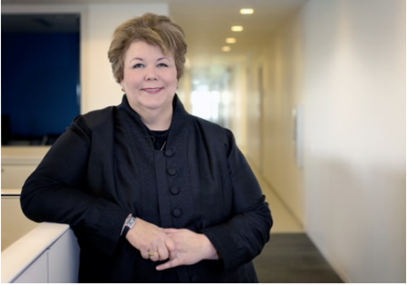

About Sharon Myers
Sharon Myers obtained her Masters in Nursing and Masters in Business from Johns Hopkins School of Nursing and holds numerous certifications including Lifetime Fellow in American College of Healthcare Executives.
Prior to starting her consultancy, Ms. Myers worked for Johns Hopkins International as an expert in patient safety, quality, accreditation, and clinical risk management. She had assignments in South America to provide consultation with healthcare systems on operations and accreditation and was appointed as the Chief Quality and Patient Safety for Johns Hopkins Aramco Healthcare (JHAH) in Dhahran, Saudi Arabia for a (4) four year contract.
During those (4) four years at JHAH, she led teams to implement clinical risk software and build systems and processes to support clinical risk identification and mitigation, ensure key performance measures were reliable and valid, and mentor and train staff in quality and patient safety concepts. She also negotiated a contract with Armstrong Institute to assist JHAH in transitioning to a more robust patient safety culture. She ensured that JHAH was successful in both the national and Joint Commission International accreditation efforts while ensuring key performance measures would align with EPIC implementation.
Having served in the Air Force at the beginning of her nursing career, Ms. Myers chose to work for the Veterans Administration as the Quality Management Officer for the VA MidSouth Healthcare Network (VISN 9) where she provided oversight for (6) six healthcare systems, ensuring utilization management, risk management, continuous survey readiness, and numerous external reviews and over 100 performance measures were successfully handled. During her time there, she served on several national task forces in Washington DC, including Medical Home, Value in Healthcare, Enterprise Risk Management and led a team for determining Quality Officer’s key competencies.
Ms. Myers has extensive middle east experience. She worked as Director of Quality Management at the King Abdulaziz Medical Center in Jeddah, Saudi Arabia for (10) ten years and successfully led that organization through their first accreditation with Joint Commission International.
During that time, she also served as the Senior Consultant for the Makkah Region Quality Program (MRQP) and the Central Board of Accreditation of Healthcare Institutions (CBAHI). She assisted with strategic and operational planning and the development of the first Hospital Standards manual that was approved by the Ministry of Health for implementation throughout the Kingdom. Subsequently, she assisted CBAHI to develop their survey process collaborating with Accreditation Canada and Joint Commission International for assistance for assistance with standards and surveyor training.
She is an international speaker on measurements, quality concepts, patient safety and accreditation, and clinical risk as well as an author in the fields of quality and patient safety. Her book, “Patient Safety and Accreditation: A Model for Ensuring Success.” was published by Springer in 2011 and marketed internationally. She currently lives in Koh Samui, Thailand with her husband John and their golden doodle, Tilly.
Sharon Myers has a diverse and international background and she is currently in the stages of completing a book to inform United States citizens and other stakeholders that overseas healthcare options should always be an option when the quality is equivalent or better and the cost is less.

Medical Travel & Digital Health News (MTDHN): Please share your background in international healthcare, quality and accreditation.
Sharon Myers (SM): I’ve been in healthcare for over 30 years and was the first to graduate in the dual degree program from Johns Hopkins University School of Nursing and Johns Hopkins University School of Continuing Studies. I earned both a Master of Science in Nursing Health Systems Management and Master of Science in Business. I am a lifetime member of the American College of Healthcare Executives.
I was privileged to serve as the Senior Consultant for the Saudi Central Board for Accreditation of Healthcare Institutions (CBAHI), the official agency authorized to grant accreditation to all governmental and private healthcare facilities operating today in Saudi Arabia. I have had a wide range of experience with consulting, teaching, clinical and strategic/operational planning
Over the years, I have consulted in South America and served as the Chief of Quality and Patient Safety in Dhahran, Saudi Arabia for Johns Hopkins International.
It’s been gratifying to leverage positive system wide change at the micro and macro systems through successful implementation of numerous programs such as the Armstrong Institute Fellowship Program, Comprehensive Unit Patient Safety Program, Surgical Unit Safety Program, Annual Patient Safety Conference and numerous other improvement projects.
I authored a book Patient Safety and Accreditation: A Model for Ensuring Success in 2011 which provides a conceptual model for building safer care for patients along with the history of both accreditation and patient safety.
I have had a great and diversified career in international healthcare and am still active.
What I most enjoy is building systems whose structures and services meet the needs of the healthcare organization/regulatory agencies and am frequently called upon as an international speaker in the areas of patient safety, culture, clinical risk, accreditation, and governing structures. I have developed workshops in the areas of patient safety, quality concepts training, clinical competencies, clinical risk, systems thinking, continuous readiness, accreditation preparedness, conflict management and team building for improvement and am a certified mentor in healthcare.
MTDHN: With such an incredible track record in international patient quality and safety, what is your current focus and the subject of your forthcoming book?
SM: I am extremely passionate about healthcare and I get really angry sometimes at the barriers to accessing healthcare.
People spend their entire lives working and dedicating themselves to a career. And then when they retire, they go on the Internet to look for a less expensive place to settle – which may include living outside the US for better value.
The problem is: U.S. Medicare won’t cover the cost of care if they access services beyond our borders.
So, I am in the middle of completing a book on the subject and want to get this changed.
MTDHN: I would imagine this impacts a lot of Americans.
SM: Yes!
When COVID-19 hit, the market changed with a little bit of backsliding. But medical travel is coming back more and more.
To my knowledge, as of 2022, the Social Security Administration reported that more than 450,000 Americans received Social Security payments while living outside the United States. This is a significant increase from 2008, when 307,000 people received benefits abroad.
The actual numbers of American retirees living abroad is not known and there are diverse numbers depending on the methodology of the data collection. For example, Democrats Abroad reported that there are approximately 1.3 million Americans overseas that are 65 years or older. and according to a 2024 Monmouth poll, the number of Americans looking to settle outside the country has tripled over the past 30 years.
People are looking for a better quality of life. They are going to Mexico, the Caribbean and all over Central and South America. It’s good weather and it’s better living. According to Gallup poll in 2023, just 43% of non-retired adults in the U.S. think they will have enough money to live comfortably when they retire so the trend to retire overseas will increase dramatically.
MTDHN: Tell us more about the issue with Medicare.
SM: Overseas, you never even get the option for Medicare coverage and people really don’t pay attention to that. Medicare is not available overseas, so I did some work with a group within the Democratic Party to start the ball rolling at researching the portability of Medicare.
What I found out is that if you’re a federal government employee you are eligible after about five years to get Medicare coverage overseas — it’s reimbursed. For retired military, there is Tricare whose beneficiaries also get reimbursed. So my brother, who’s a retired Navy, he could retire to Thailand and get care, reimbursed by Medicare.
If these people are getting reimbursed under Medicare regardless of where they access healthcare services, why shouldn’t every retiree be able to do so? The systems are in place but the politics are the challenge.
MTDHN: Does hospital/provider accreditation matter? Many hospitals outside the U.S. are accredited by Joint Commission International or other credible bodies.
SM: People need to know that a place is safe and be able to trust the care he/she will receive. Accreditation means that an external body assessed the organization’s performance for both clinical and organizational standards that are patient safety oriented.
Some sort of accreditation should be mandatory. For example, in Saudi Arabia I was the Senior consultant for the Mecca region quality program and conducted both the strategic and the operational planning. The teams ensured that the national accreditation program became ISQUA accredited so there was an external accreditation system for the accreditors as well. Many countries have their own national accreditation program that is ISQUA accredited including the United States own Joint Commission.
MTDHN: Do you think it’s feasible to get Medicare to agree to cover care outside the U.S.? I guess it would require regulatory change.
SM: It has to come from a political action. Medicare is not self -sustaining and outsourcing services to foreign countries with equivalent quality at lower costs would be cost savings for Medicare. The FY2022 Appropriations Act report requested the Centers for Medicare and Medicaid Innovation (CMMI) to consider pilot projects overseas that will lower costs and not sacrifice quality. Also, recently Bill HR5299 aims to establish a demonstration program for international coverage under the Medicare program.
But I do think this is very do-able. One of the challenges they will pose is that it can’t be implemented. My retort is that it is already implemented but just for a subset of Americans – but the public doesn’t know!
I believe this needs marketing and raising public awareness – that’s why I’m writing the book. It is the first step.
If the infrastructure and quality measurements are already there, there should be no question. I’m a strategic person and for implementation, the first step is increasing awareness to the public who deserves to be able to have quality healthcare anywhere they choose when the quality is equivalent and the cost is cheaper.
For example, a hip replacement is approximately $40,000 in the U.S. and is much cheaper in many foreign countries with equivalent or even better quality. For example, a hip replacement is only $7000 dollars in India, Germany, or Spain.
Cost wise, there is absolutely no comparison! It is so much cheaper.
MTDHN: Do you know anyone personally who has traveled outside the US for medical care?
SM: I actually have a physician friend who is thinking of coming to Thailand to get some dental implants. He is paying out of pocket because dental is not covered in Medicare.
MTDHN: This appears to be a major undertaking to convince Medicare.
SM: It’s a major undertaking to get this all geared up. The general public in the USA don’t know what they don’t know. The first step is to increase awareness, then political pressure.
I want to get started as soon as my book titled, “Medicare or Medican’t: What You Need to Know Before Retiring Overseas and What to Do About It,” comes out and begin this big conversation.
It’s not only unfair but it makes good business sense for Medicare.